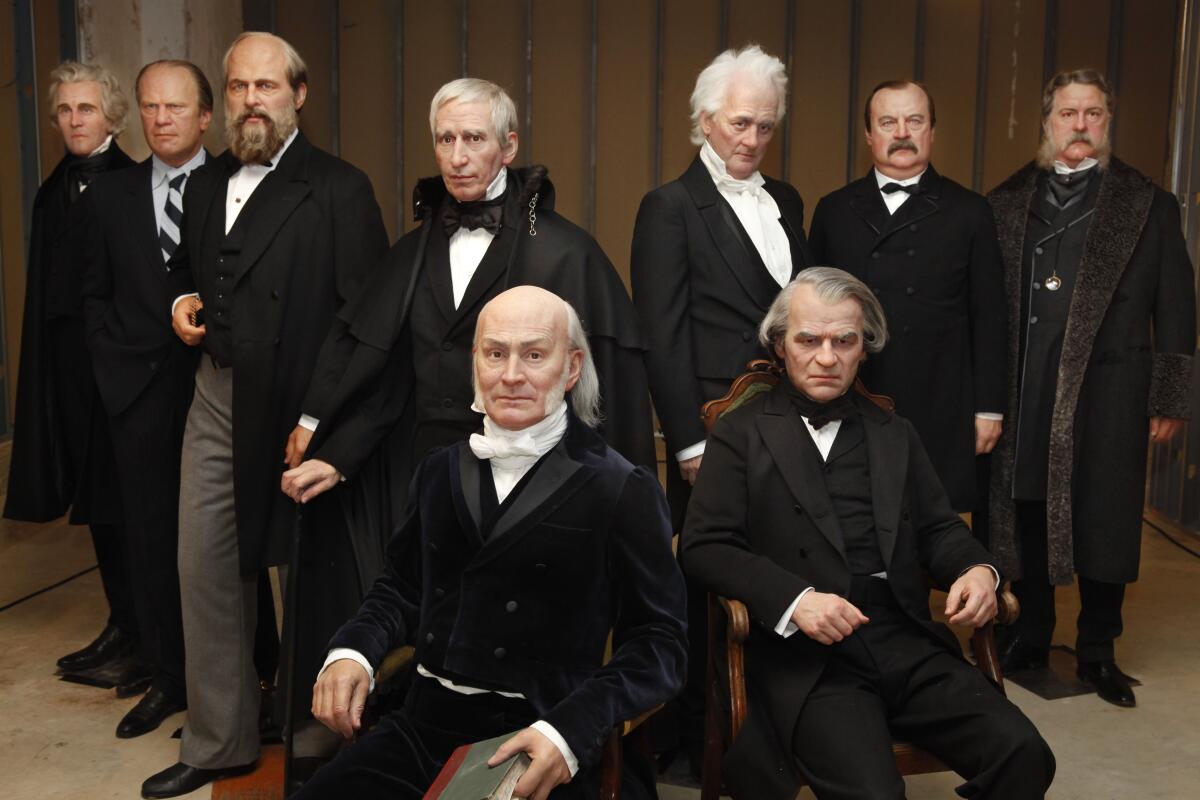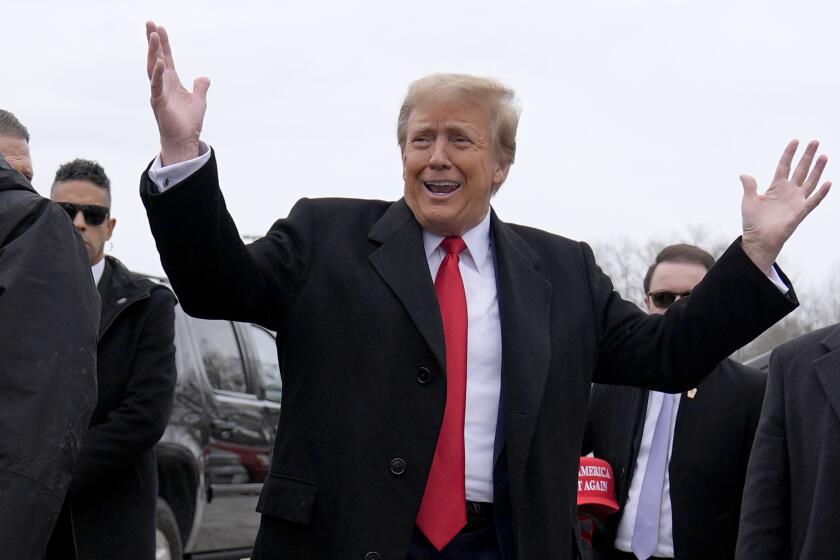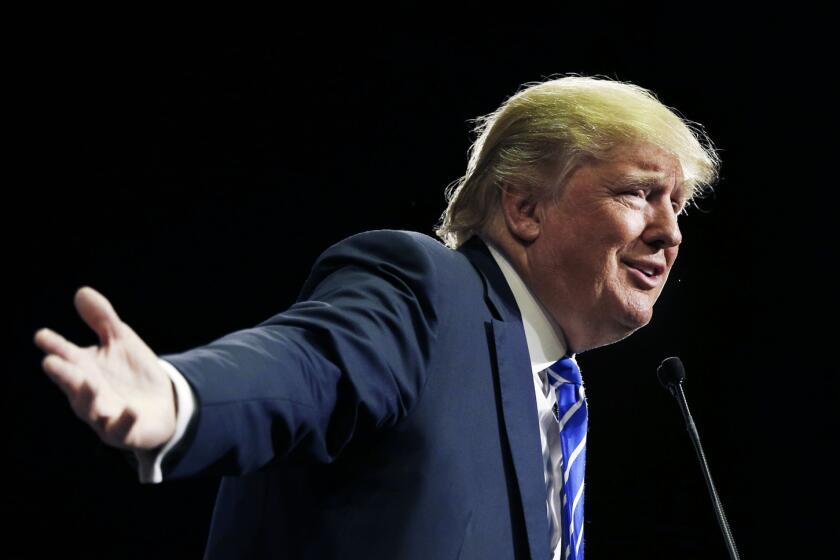Opinion: We know how voters feel about Trump and Biden. But how do the experts rank their presidencies?

- Share via
Presidents Day occurs at a crucial moment this year, with the presidency on the cusp of crisis as we inexorably shuffle toward a rematch between the incumbent and his predecessor. It’s the sort of contest we haven’t seen since the 19th century, and judging by public opinion of President Biden and former President Trump, most Americans would have preferred to keep it that way.
But the third installment of our Presidential Greatness Project, a poll of presidential experts released this weekend, shows that scholars don’t share American voters’ roughly equal distaste for both candidates.
Biden, in fact, makes his debut in our rankings at No. 14, putting him in the top third of American presidents. Trump, meanwhile, maintains the position he held six years ago: dead last, trailing such historically calamitous chief executives as James Buchanan and Andrew Johnson. In that and other respects, Trump’s radical departure from political, institutional and legal norms has affected knowledgeable assessments not just of him but also of Biden and several other presidents.
Like Biden, Obama and Reagan had rough reelection polls. Too many journalists treat polls as predictive, but political professionals use them to inform campaigns.
The overall survey results reveal stability as well as change in the way scholars assess our nation’s most important and controversial political office. Great presidents have traditionally been viewed as those who presided over moments of national transformation, led the country through major crises and expanded the institution of the presidency. Military victories, economic growth, assassinations and scandals also affect expert assessments of presidential performance.
The presidents at the top of our rankings, and others like ours, reflect this. Hallowed leaders such as Abraham Lincoln, Franklin Delano Roosevelt and George Washington consistently lead the list.
Our latest rankings also show that the experts’ assessments are driven not only by traditional notions of greatness but also by the evolving values of our time.
President Trump’s final grade will be in the hands of scholars. It doesn’t look good.
One example is the continuing decline in esteem for two important presidents, Andrew Jackson and Woodrow Wilson. Their reputations have consistently suffered in recent years as modern politics lead scholars to assess their early 19th and 20th century presidencies ever more harshly, especially their unacceptable treatment of marginalized people.
More acutely, this survey has seen a pronounced partisan dynamic emerge, arguably in response to the Trump presidency and the Trumpification of presidential politics.
Proponents of the Biden presidency have strong arguments in their arsenal, but his high placement within the top 15 suggests a powerful anti-Trump factor at work. So far, Biden’s record does not include the military victories or institutional expansion that have typically driven higher rankings, and a family scandal such as the one involving his son Hunter normally diminishes a president’s ranking.
Biden’s most important achievements may be that he rescued the presidency from Trump, resumed a more traditional style of presidential leadership and is gearing up to keep the office out of his predecessor’s hands this fall.
Trump’s position at the bottom of our rankings, meanwhile, puts him behind not only Buchanan and Johnson but also such lowlights as Franklin Pierce, Warren Harding and William Henry Harrison, who died a mere 31 days after taking office.
Trump’s impact goes well beyond his own ranking and Biden’s. Every contemporary Democratic president has moved up in the ranks — Barack Obama (No. 7), Bill Clinton (No. 12) and even Jimmy Carter (No. 22).
Yes, these presidents had great accomplishments such as expanding healthcare access and working to end conflict in the Middle East, and they have two Nobel Prizes among them. But given their shortcomings and failures, their rise seems to be less about reassessments of their administrations than it is a bonus for being neither Trump nor a member of his party.
Indeed, every modern Republican president has dropped in the survey, including the transformational Ronald Reagan (No. 16) and George H.W. Bush (No. 19), who led the nation’s last decisive military victory.
Academics do lean left, but that hasn’t changed since our previous surveys. What these results suggest is not just an added emphasis on a president’s political affiliation, but also the emergence of a president’s fealty to political and institutional norms as a criterion for what makes a president “great” to the scholars who study them.
As for the Americans casting a ballot for the next president, they are in the historically rare position of knowing how both candidates have performed in the job. Whether they will consider each president’s commitment to the norms of presidential leadership, and come to rate them as differently as our experts, remains to be seen.
Justin Vaughn is an associate professor of political science at Coastal Carolina University. Brandon Rottinghaus is a professor of political science at the University of Houston.
More to Read
A cure for the common opinion
Get thought-provoking perspectives with our weekly newsletter.
You may occasionally receive promotional content from the Los Angeles Times.










